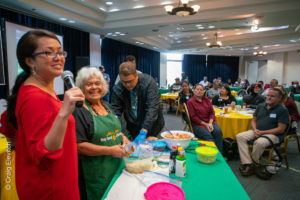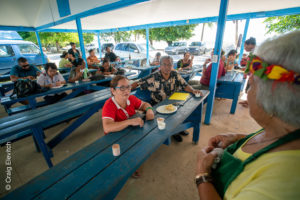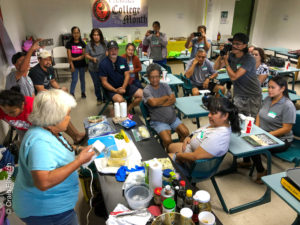Final report for EW17-004
Project Information
This project enhances the ability of Pacific Island agricultural professionals to train producers in breadfruit agroforestry based on indigenous knowledge and modern science to regenerate degraded lands, produce large quantities of gluten-free nutritious food, and stimulate creative local food enterprise development. Prior to Western contact, agroforestry systems with breadfruit trees as a major component provided large quantities of nutritious starchy food for people and livestock, while protecting and enhancing soil and watershed quality. Many of these breadfruit agroforests in the U.S.-affiliated Pacific Islands were removed during the 1900’s to accommodate plantation monocultures, open pasture, and urbanization.
Over the past several years, breadfruit has attracted renewed attention for its commercial potential in large-scale export markets, which has in turn brought a wave of conventional monoculture plantings reliant upon synthetic chemical inputs. Many traditional leaders, NGO’s, extension programs, and farmer organizations are calling for breadfruit cultivation in sustainable systems indigenous to the region, a legacy that extends back millennia, to be revitalized for the modern context.
This project brings together a collaborative team of experts in breadfruit, agroforestry, agronomy, and value-added processing to produce a manual for breadfruit agroforestry and present workshops on seven U.S.-affiliated Pacific Islands. Breadfruit’s exceptional versatility (baked goods, vegetable, desserts, etc.) will be highlighted to stimulate creative local food ventures. Additionally, numerous other crops selected for wide adaptability, high productivity, nutritious yields, commercial potential, and compatibility in breadfruit agroforestry are highlighted, encouraging producers to develop a portfolio of crops to mitigate environmental and market risks.
This project provides professional development training (manual, videos, and workshops) for breadfruit agroforestry based upon indigenous knowledge and modern agroforestry techniques to address problems of environmental degradation, nutrition and food security, depressed local food economies, and susceptibility to weather extremes due to climate change in the U.S.-affiliated Pacific Islands.
Objective 1: Author a manual for breadfruit agroforestry for the U.S.-affiliated Pacific Islands. Subjects include: complementary crop selection, layout, site preparation, establishment techniques, crop management, organic matter production, crop harvest and value-added processing. The manual will be at least 60 pages in length, illustrated by 50 or more full-color photos and illustrations. In addition to printed copies for workshop participants, the manual will be posted to the project team’s respective web sites for free download. The manual will be completed within 12 months of the project start.
Objective 2: Present professional development workshops in Hawai‘i, Marshall Islands, Kosrae, Pohnpei, Palau, Guam, and American Samoa. Each workshop will be 2 or 3 days long, depending upon the location and flight schedules. Topics covered are those included in the manual. Workshops will include a mix of classroom-style presentations and hands-on activities, including field visits and value-added processing activities. We expect that each workshop will be attended by a minimum of 25 agricultural professionals, policymakers, and educators, for a minimum total of 175 participants. In some locations, the number of participants may be considerably larger (our past experience has been 60–100 participants). Workshops will be complete within 12 months of the project start.
Pacific islanders such as indigenous Hawaiians and Micronesians once had sustained-yield perennial home and community agroforests that made them among the most well-nourished and self-sufficient peoples in the world. Widespread throughout the region, agroforests with breadfruit as a major component (“breadfruit agroforests”) integrated numerous highly productive crops including banana, coconut, and taro.
Over the past 200 years, degradation of prime agricultural lands caused by clearing of native forests and breadfruit agroforests for animal grazing and large-scale plantation agriculture has reduced baseline agricultural capacity in the region and created an alarming dependency on food imports. Imports now account for up to 90% of island food consumption in U.S.-affiliated Pacific islands (Hawai‘i, Pohnpei, Palau, Marshall Islands, American Samoa, Guam, CNMI, etc.). This transition from traditional healthy diets to imported processed, high-fat and refined carbohydrate foods has led to some of the highest rates of nutrition- based non-communicable diseases in the world.
Since 2010, efforts to revitalize breadfruit agroforestry co-led by the Project Coordinator (breadfruit.info) have grown steadily throughout the U.S.-affiliated Pacific Islands. At the May 2014 Western SARE conference, a significant presentation about breadfruit agroforestry was well received, with numerous requests received for workshops and additional information from around the Pacific.
In Hawaii alone, an estimated 10,000 breadfruit trees have been planted since 2012, with hundreds of trees planted in other island states. Without adequate training, many growers have defaulted to clear-culture monoculture cultivation dependent upon synthetic chemical inputs, rather than time-tested and sustainable agroforestry systems. This project will create a new context for the sustainable cultivation of breadfruit based upon its indigenous roots and modern science.
An on-going WSARE-funded PDP project by the project participants (EW16-008), covers wide-ranging agroforestry design, rather than focusing on demand for specific breadfruit agroforestry training. Another current WSARE project (OW15-031) includes breadfruit in agroforestry demonstrations, but does not concentrate on multistory breadfruit production systems and is limited to Guam (this proposal covers six other Pacific islands).
Cooperators
- (Educator)
- (Educator)
- (Educator)
- (Educator)
- (Educator)
Education
The project produced two manuals and presented a series of workshops throughout the Pacific. The manual presents the concepts of planning and implementing multistory agroforestry with breadfruit as a major component based upon the indigenous agroforestry systems of the Pacific Islands. After production of the manual, the second phase of the project presented eight workshops for agricultural extension, NRCS, government agencies, NGO’s, and agricultural professionals.
Education & Outreach Initiatives
Publish a manual for planning and implementing breadfruit agroforestry.
Two manuals were produced for this project during 2018. In a collaboration with the Breadfruit Institute of the National Tropical Botanical Garden, the first manual entitled Breadfruit Agroforestry Guide: Planning and implementation of regenerative organic methods assembles knowledge from time-tested traditional agroforestry systems together with the latest information on modern agroforestry systems. Topics covered include planning, orchard establishment, products and markets, and breadfruit cultivars. All concepts are well illustrated with photographs and line drawings. The 64-page manual has over 100 full-color photographs and illustrations as well as 28 tables. The second publication entitled Manual for the Presentation of Breadfruit Agroforestry Information by Extension Agents, was developed specifically for agricultural extension agents. The 20-page document covers enhancing breadfruit agroforestry adoption through extension, participatory approaches, group formation and outreach, on-farm demonstration, and monitoring and evaluation. Project publications are available for free download as pdf files at www.breadfruit.info and www.breadfruit.org (estimated number of downloads in 2018-19 is 1,500). Over 400 copies of the publications were distributed to workshop participants and workshop host organizations received hard copies of the publications.
- Bring together indigenous and scientific knowledge about Pacific Island breadfruit agroforestry systems in a readily accessible form.
- Stimulate development of educational curricula in breadfruit agroforestry in universities, colleges, and vocational schools.
- Form a knowledge base that can be used to justify research and demonstration of sustainable breadfruit production systems.
- Train a new generation of agricultural professionals in agroforestry management and the extension methods to share the information with clients. These professionals will share sustainable breadfruit cultivation in agroforestry systems with the general public.
-
Soil and water quality improvement due to conservation services provided by appropriately implemented breadfruit agroforestry systems.
-
Decreased use of artificial chemical inputs in human landscapes.
Present seven workshops throughout the U.S.-affiliated Pacific Islands
The second phase of the project presented eight workshops for agricultural extension, NRCS, government agencies, NGO’s, and agricultural professionals. The workshops were presented during March and April 2019 in Hawai‘i, Marshall Islands, Chuuk, Pohnpei, Palau, Saipan, Tinian, and American Samoa, covering much of U.S.-affiliated Pacific Islands. Workshops consisted of a day of classroom-style presentations focusing on concepts presented in the manual followed by a day of hands-on outdoor activities and field tours. Participants became familiar with the two project manuals and experienced aspects of breadfruit agroforestry. Numerous other crops (e.g., banana, coconut, taro, cassava, papaya and others appropriate to the local setting) selected for wide adaptability, high productivity, nutritious yields, commercial potential, and compatibility with breadfruit were highlighted in the training. The workshops were organized in close partnership with local governmental and nongovernmental agricultural institutions. Over 420 total participants attended the workshops.
- Raise awareness of breadfruit agroforestry as a viable and sustainable strategy for food production, soil and water resource conservation, and climate change adaptation.
- Target audience will have an increased awareness of viable strategies for breadfruit agroforestry systems and strategies for implementing them.
- Participants will better understand the ecological and economic implications of growing breadfruit in agroforestry, both advantages and disadvantages.
- Extension professionals will recommend breadfruit agroforestry to clientele as ecologically and economically sustainable.
- Agricultural micro-enterprises will be strengthened by availability of crops for local and export markets, as well as value-added opportunities.
- University and other research entities will increase their research efforts into diverse and sustainable local food systems.
- Improved adaptation of local food systems to weather extremes expected due to climate change.
- Rural livelihoods will be improved through crop diversification and development of new local and export markets.
Educational & Outreach Activities
Participation Summary:
Learning Outcomes
Project Outcomes
Enthusiasm for the workshops and manuals exceeded our original expectation, with over 420 participants attending compared with 175 expected. When asked, “Did you gain or increase knowledge, awareness and skills about sustainable agricultural topics, practices, strategies, and approaches?”, 98% of participants responded “yes”. To the question, “How many farmers/ranchers do you estimate you will share some asect of this learning event with?”, respondents responded that they expect to impact a total of 5,560 people.
In a post-workshop evaluation that took place several months after the workshops, 92% of participants reported that their ability to include agroforestry practices in their activities had changed (very much: 25%, quite a bit: 38%, some: 29%). 87% reported that the workshop publications significantly impacted their agroforestry planning ability (very much: 29%, quite a bit: 41%, some: 17%).
Representative comments echoed by many include:
“The information you shared to this group should be conducted/echoed on all possible sectors/agencies of the island--so everyone will know and embrace the project of valuing the importance of breadfruit … and do agroforestation.”—Saipan
“All the lectures are very interesting. We can re-echo to our people in the community. The books are very useful to teach our church members, Chuukeese people. Appreciate all the topics we have learned.”—Chuuk
“Presenters are commended for their excellent presentations. Highly recommend this workshop for village settings especially farmers, homemakers and youth.”—American Samoa
“Thank you, the workshop will help change some of the mindset of our farmers.”—Palau
“It was a pleasure to attend this seminarof agroforestry. We have been doing this all along but it wasn't really clear to our understanding.”—Marshall Islands
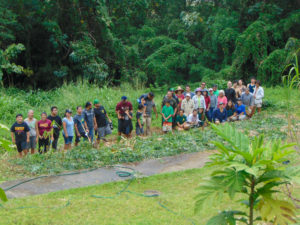
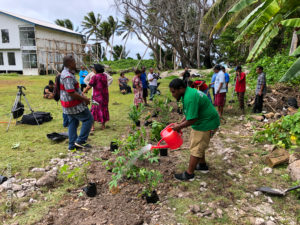
During the writing of the breadfruit agroforestry manual, a collaboration with the Breadfruit Institute of the National Tropical Botanical Garden was developed, allowing the inclusion of detailed breadfruit cultivar and product development information. The manual was therefore co-published with the Breadfruit Institute. Given the worldwide audience for Breadfruit Institute educational materials including through social media, this collaboration raised awareness of this work to a much greater audience.
Aunty Shirley Kauhaihao, a life-long resident of Honaunau, Kona, Hawaii and icon of her community, joined the project workshops to teach about the breadfruit dishes she has developed over the past 10 years. Aunty Shirley demonstrated her dishes at seven of the workshops. Although not originally planned to be part of the workshops, Aunty Shirley’s demos turned out to be a highlight of the workshops, connecting people and inspiring them with all the creative ways breadfruit can be used in appetizers, main dishes, and desserts. Aunty Shirley’s presence at the workshops was an invaluable contribution to reach people at a deep level through connection to food and culture.
